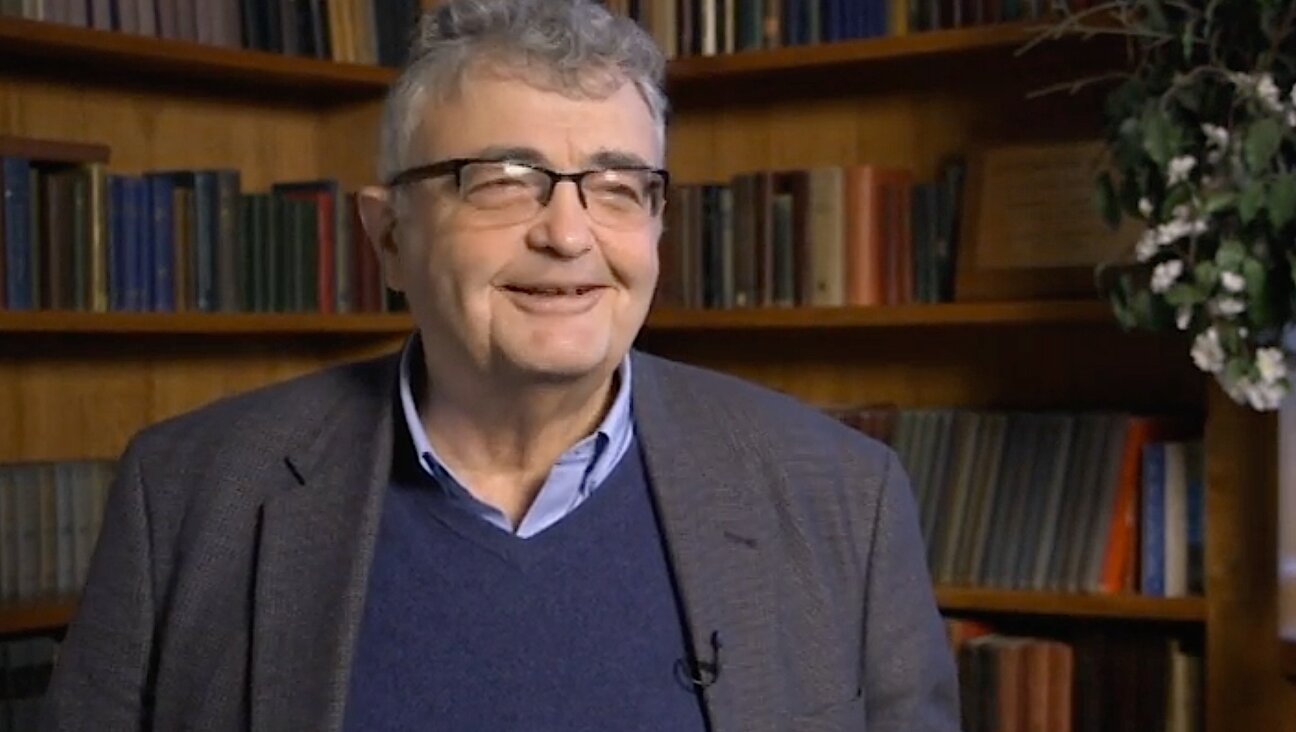As An Argentinian-Israeli, I’m Ashamed My Country Dropped The Ball

Lionel Messi of Argentina stretches before an international friendly match between Argentina and Haiti at Alberto J. Armando Stadium on May 29, 2018 in Buenos Aires, Argentina. Image by Getty Images
Some have credited the Boycott, Divestment and Sanctions movement with the Argentina’s Football Association’s recent decision to cancel the last friendly match with Israel before the start of the 2018 Russia World Cup. This decision, however, was taken after the head of Palestinian Football Association, Jibril Rajoub, made several threats against a star player of the AFA team. In order to better understand the underlying severity of these threats, it is imperative to take a close look at who Rajoub really is.
In 1970, Jibril Rajoub was sentenced to life in prison for throwing a grenade at an Israeli army truck, and subsequently climbed the ladder of the Fatah party to become a close confidant of Yasser Arafat in the 1980’s. With the signing of the Jibril Agreement in 1985, Rajoub was released, alongside 1,150 Palestinian prisoners, in exchange for three Israeli hostages. He became a security advisor for Arafat and led several security agencies under the political umbrella of the Palestinian Authority. Rajoub managed to squash political opposition and perpetuated the conflict with Israel by denouncing reconciliation.
Through his leadership as head of the Palestinian Olympic committee and the Palestinian Football Association, Rajoub made more efforts to make Israel a pariah in the international sporting community than to incorporate Palestinian teams and encourage sports as a form to push dialogue forward. In an interview with an Iranian TV program, Rajoub commented:
“As I’ve told you, we want to maintain the state of conflict between Palestine and the occupation. This applies to all components of the Palestinian people because we want all the Palestinians to participate in the resistance. We want the Palestinians within the 1948 borders to demand equality, the Palestinians within the 1967 borders to demand independence and liberty, and the Palestinians in the diaspora to demand the Right of Return. I believe that by international law, we have the right to conduct any form of resistance, in the occupied lands and against the occupation, in order to put an end to the occupation.”
Just last year, thirty bereaved families filed complaints against Jibril Rajoub for inciting terror and advocating for the kidnappings of future IDF soldiers.
Having served in various positions of leadership within the Palestinian Authority, Jibril Rajoub represents the larger Palestinian strategy. This consists of gaining international sympathy for Palestinian suffering while perpetuating the conflict with Israel through a clear intent of preserving the political status-quo by avoiding serious peace talks.
The threats that led Argentina to suspend the game with Israel before the 2018 World Cup impacted me on a more personal level.
Having grown up in Argentina, I understand the value of the World Cup to the country. In a nation full of economic despair, security concerns, and a seemingly undefeatable corrupt government, this international soccer tournament gives value and a true sentiment of belonging throughout the nation. Soccer is the language that speaks to Argentinians. With every goal scored or conceived, the cries and screams are heard in all of its neighborhoods. Since 1986 (the last year Argentina won the World Cup with Diego Maradona’s leadership), the AFA made efforts to play the last friendly game before an upcoming World Cup in Israel for spiritual and hopeful belief that a victory could be reclaimed. This time, the mainstream media’s efforts to demonize Israel and the Palestinian threats to “target Messi specifically”, were enough to deter Argentina from bringing joy to millions before the most watched sporting event in the world began. These threats can be clearly seen by Jibril Rajoub’s comments to the press just twenty-four hours before the sudden cancellation of the match:
“We will target Messi, and will demand that everyone burn their [Messi] shirts and pictures and renounce him — but we still hope that on Thursday, Messi will not come and will not be exploited to whitewash the occupation’s crimes… I do not think that there is a difference between what is happening today and what happened in Europe in the 1930s.”
As an Argentinean-Israeli I am beyond disappointed and ashamed of my team’s decision to succumb to terror and cancel the highly anticipated game. What organizations such as Jewish Voices for Peace (through their statement of support for BDS regarding the match on June 6th) seem unable to understand is that international boycotts against Israel are only furthering the negotiation table and preventing any form of reconciliation to take place between both parties of the conflict. The Jewish community in Argentina (the largest in South America) is outraged and strategists throughout the world must be concerned. Only a well-established and strong enough deterrent can reduce or even prevent terrorism yet, this episode demonstrated the lack in will (on behalf of Argentina) to reward terrorism and encourage the cultivated notion of anti-Zionism within the Palestinian Authority.
Despite Argentina’s long standing institutional bias against Israel, these threats made on behalf of the Palestinian leadership led Claudio Tapia (director of the AFA), to state that: “The suspension of the game is [in] the hopes of establishing world peace.”
Tapia is wrong, the suspension of the game does not bring peace it only furthers it. It shows the Palestinian Authority that through strong enough threats, the international community will succumb to the strategy of victimization. This is not the way to move forward; rather we should be encouraging dialect and participation in sporting events instead.
The Forward is free to read, but it isn’t free to produce

I hope you appreciated this article. Before you go, I’d like to ask you to please support the Forward.
Now more than ever, American Jews need independent news they can trust, with reporting driven by truth, not ideology. We serve you, not any ideological agenda.
At a time when other newsrooms are closing or cutting back, the Forward has removed its paywall and invested additional resources to report on the ground from Israel and around the U.S. on the impact of the war, rising antisemitism and polarized discourse.
This is a great time to support independent Jewish journalism you rely on. Make a gift today!
— Rachel Fishman Feddersen, Publisher and CEO
Support our mission to tell the Jewish story fully and fairly.
Most Popular
- 1

Opinion The dangerous Nazi legend behind Trump’s ruthless grab for power
- 2

Culture Trump wants to honor Hannah Arendt in a ‘Garden of American Heroes.’ Is this a joke?
- 3

Opinion A Holocaust perpetrator was just celebrated on US soil. I think I know why no one objected.
- 4

Culture Did this Jewish literary titan have the right idea about Harry Potter and J.K. Rowling after all?
In Case You Missed It
-

Fast Forward Protesters clash in Crown Heights as Ben-Gvir visits Chabad headquarters
-

Yiddish ווידעאָ: היסטאָריקער שמואל קאַסאָוו דערציילט מעשׂיות פֿון זײַן משפּחה־געשיכטעVIDEO: Historian Samuel Kassow shares stories about his family history
דער ווידעאָ איז טשיקאַווע סײַ פֿאַרן אינהאַלט סײַ פֿאַר קאַסאָווס נאַטירלעכן ליטוויש־ייִדיש
-

Culture I have seen the future of America — in a pastrami sandwich in Queens
-

Culture Trump wants to honor Hannah Arendt in a ‘Garden of American Heroes.’ Is this a joke?
-
Shop the Forward Store
100% of profits support our journalism
Republish This Story
Please read before republishing
We’re happy to make this story available to republish for free, unless it originated with JTA, Haaretz or another publication (as indicated on the article) and as long as you follow our guidelines.
You must comply with the following:
- Credit the Forward
- Retain our pixel
- Preserve our canonical link in Google search
- Add a noindex tag in Google search
See our full guidelines for more information, and this guide for detail about canonical URLs.
To republish, copy the HTML by clicking on the yellow button to the right; it includes our tracking pixel, all paragraph styles and hyperlinks, the author byline and credit to the Forward. It does not include images; to avoid copyright violations, you must add them manually, following our guidelines. Please email us at [email protected], subject line “republish,” with any questions or to let us know what stories you’re picking up.
















